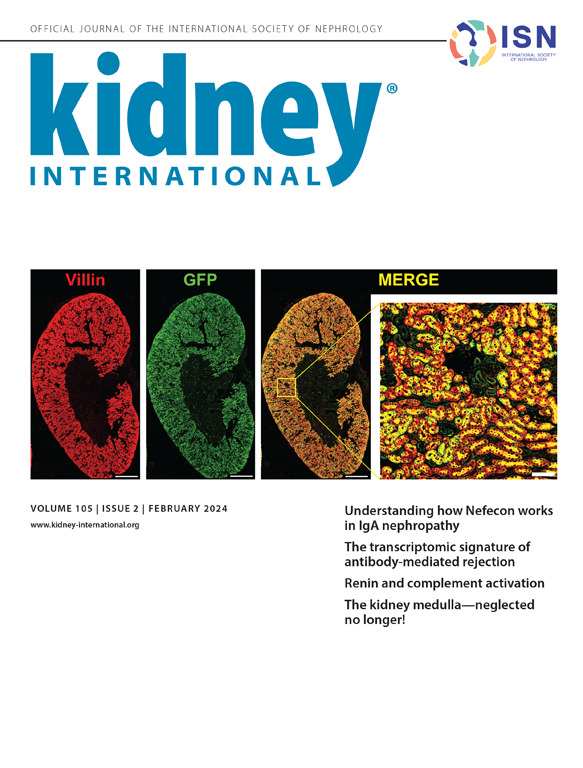KDIGO 2025儿童肾病综合征管理临床实践指南执行摘要
IF 14.8
1区 医学
Q1 UROLOGY & NEPHROLOGY
引用次数: 0
摘要
肾脏疾病:改善肾小球疾病管理的全球结局(KDIGO)临床实践指南于2021年更新并发布。KDIGO继续致力于为肾脏病学界提供基于每种肾小球疾病的新发展的定期更新。对于患有肾病综合征的儿童,更新后的指南现在包含了一个治疗算法,关于何时进行肾活检和/或基因检测,以及对糖皮质激素(类固醇敏感)完全缓解的儿童使用哪种免疫抑制疗法,这些儿童随后成为罕见或频繁复发,甚至依赖类固醇。如果在初始糖皮质激素治疗失败后必须考虑使用糖皮质激素保留剂来诱导缓解,那么在钙调磷酸酶抑制剂、口服环磷酰胺、左旋咪唑、霉酚酸酯和利妥昔单抗之间的选择需要考虑与患者相关的问题,如资源、依从性、不良反应和患者偏好。在此,对《KDIGO 2025儿童肾病综合征临床实践指南》中最重要的变化进行摘要,作为快速参考。本文章由计算机程序翻译,如有差异,请以英文原文为准。
Executive summary of the KDIGO 2025 Clinical Practice Guideline for the Management of Nephrotic Syndrome in Children
The Kidney Disease: Improving Global Outcomes (KDIGO) Clinical Practice Guideline for the Management of Glomerular Diseases was last updated and published in 2021. KDIGO continues to be committed to the nephrology community to provide periodic updates, based on new developments for each of the glomerular diseases. For children with nephrotic syndrome, the updated guideline now contains a treatment algorithm on when to perform a kidney biopsy and/or genetic testing and which immunosuppressive therapy to use in children with a complete response to glucocorticoids (steroid sensitive), who subsequently become infrequent or frequent relapsers or even steroid dependent. If a glucocorticoid-sparing agent must be considered after failure of an initial glucocorticoid therapy to induce remission, the choice among a calcineurin inhibitor, oral cyclophosphamide, levamisole, mycophenolate mofetil, and rituximab is a decision that requires consideration of patient-related issues such as resources, adherence, adverse effects, and patient preferences. Herein, an executive summary of the most important changes in the KDIGO 2025 Clinical Practice Guideline for the Management of Nephrotic Syndrome in Children is provided as a quick reference.
求助全文
通过发布文献求助,成功后即可免费获取论文全文。
去求助
来源期刊

Kidney international
医学-泌尿学与肾脏学
CiteScore
23.30
自引率
3.10%
发文量
490
审稿时长
3-6 weeks
期刊介绍:
Kidney International (KI), the official journal of the International Society of Nephrology, is led by Dr. Pierre Ronco (Paris, France) and stands as one of nephrology's most cited and esteemed publications worldwide.
KI provides exceptional benefits for both readers and authors, featuring highly cited original articles, focused reviews, cutting-edge imaging techniques, and lively discussions on controversial topics.
The journal is dedicated to kidney research, serving researchers, clinical investigators, and practicing nephrologists.
 求助内容:
求助内容: 应助结果提醒方式:
应助结果提醒方式:


